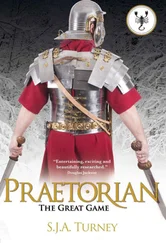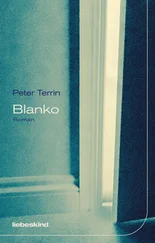135
The remnants are lying on the bottom of the bowl, a shriveled sack of pale yellow scales. The goldfish died of suffocation or starvation or both, the only visible victim of the situation outside. Its dark eye has subsided and is staring inwards, as if desperate to turn away from what it saw from the windowsill.
Was the goldfish forgotten because it was everybody’s and nobody’s? Or did the difficulties prevent the owner from returning to the apartment, leaving them with a sickly sense of impotence every time they ate or drank?
This is just the first floor, Harry tells me. I might not believe it, but it’s true. None of our wealthy residents would have bought a first-floor apartment if the windows only provided a view of the windows of a neighboring building. That’s why the first floor is much higher than usual. He says we’re in the wrong place for a good view of the city.
In the kitchen he opens the cupboards. It’s a kitchen that was rarely, if ever, used for cooking. The apartment’s real kitchen, the large one where all of the meals were prepared, can’t be far away either. This one was for talking, sitting around, eating sandwiches or warming up leftovers. Two cupboards are filled with glasses, mugs and plates. Harry finds a canister of fish food and the instructions for a coffee machine that’s nowhere in sight. He picks out two sets of cutlery from the cutlery drawer and puts them in the inside pocket of his jacket, as if it’s not food that’s been in short supply, but knives, forks and spoons. In the fridge, a tin rolls around in the bottom of the vegetable drawer.
“Drink up,” Harry says. “You can use it.”
He hands me a garish fortifying drink.
Why can I use it more than him?
“We’ll share,” I say assertively.
“Of course we’ll share,” Harry says. “Hurry up.”
I sit down on the armrest of the sofa and guzzle frenzied fizz that tingles in my nose and eyes; I don’t taste a thing. While Harry’s drinking, I notice a magazine in a wooden rack between the sofa and the window. It dates from before the exodus. On the front page a celebrity turns her bloodshot eyes away from the camera. On her arm, a man who does look into the lens, angry and desperate. They are hurriedly leaving a building. The caption under the photo: “Why won’t they let us be happy?”
“Check out those boobs,” Harry says.
I open the magazine; the paper has turned stiff. In her preface, the editor reviews the contents. Not the slightest insinuation of a political or social issue. I leaf on, diagonally scanning the blocks of text: births, marriages, illness, deaths, the normal entertainment. I study the cartoon, which goes on about the couple on the cover and their impossible happiness. They’re featured in their underwear, the woman bare-breasted. Her nipples, indented around the edges as if they’re flowers, reach out to the warmth of the spotlights. I study the crossword, the ads. I leaf back, looking at all of the faces, captions, the questions in bold face. One catches my eye. A man in his fifties with an old-fashioned tapered mustache, a singer or a soap star, posing on a motorcycle in front of a villa, is asked if things are different now, given recent events, from how they were before. As far as that’s concerned, the man replies, a celebrity like him is no different from ordinary people and equal before the law. Plus he has to set an example.
136
In the hall, behind another storeroom with two doors, this time with coats on hooks, we find more stairs. The height difference to the second floor is considerably less. We take the time to climb in silence, on our guard. On the fourth floor we come out on a landing that extends for a good fifty meters and leads to the continuation of the stairs. Harry says, with one foot on the new stairs, that it doesn’t make any damn sense. He asks if it makes sense to me. I get the strong impression, I say, that originally they didn’t plan for stairs. When they were forced to include them after all, this is what they came up with, squeezing them in left and right. I tell him I don’t know either. On the next floor up, the stairs go down again at the end of the landing. It’s unclear how many steps. Harry doesn’t trust it and hugs the wall, lowering his feet slowly as if the steps are made of rotten wood, high above a ravine.
137
We’ve counted properly and haven’t let the stairs’ antics get to us. Or is it just an unlikely coincidence? When we enter the apartment, separated from the stairwell by an elongated room tiled in the same white as the narrow hall on the ground floor, we’re standing almost next to the service elevator, another neutral environment in plain gray. Mounted on the wall opposite the elevator is an elegant brushed-aluminum plate in which a 2 and a 9 have been stamped; the indicator in the frame reads -1. I whisper that the stairs wind their way around the building and have brought us back to the elevators after all, but Harry isn’t listening to my explanations. He aims the flashlight at the wall between us and the residents’ and visitors’ elevators. He presses his ear against it; I wait, holding my breath.
No daylight in these halls. Night has fallen, we’ve been going almost four hours. These staff quarters clearly have a different layout from the ones on the first floor. There is no kitchen adjoining the living room. A table and chairs, no lounge suite. The chairs are arranged willy-nilly, as if the people left in a hurry. Harry and I sit on the floor and try to relax. The flashlight shines across the floor, casting long shadows behind crumbs and dirt and balls of fluff.
The square window with a view of the starless sky: suddenly I think of the city below us and creep over to the window with Harry lighting my way. He asks what I’m doing and follows me.
Big dark patches, businesses, department stores or housing blocks, demarcated by streetlights. I can’t see any cars driving in the streets close by. Lit windows are few; it could be five a.m. I search for TV sets, but don’t find any. I do spot a traffic light. Just the top of it, the red light, nothing of the intersection itself. When I fix my eyes on it, this is the only movement I detect in my entire field of vision: the red light flicking on and turning off again. And the varying intensity of the full moon behind the thin layer of cloud.
138
We come upon swing doors with small porthole windows and know that we needn’t look any farther. Where else would they use swing doors except between the service section and the luxury apartment? The sides of the doors are lined with silky-soft brushes. The flashlight smears a bluish-black gleam over the velvet that covers the backs of the doors from top to bottom, with the exception of one gold-colored circle, split neatly into two halves down the middle: Plexiglas for pushing the doors open. It’s dark behind the portholes.
Harry and I ball ourselves up against the wall. How are we going to do this? Without posing the question, we both search anxiously for an answer. It goes without saying that the resident will have a gun at his disposal. Even a bullet from an elegant lady’s pistol can be fatal. He’s lying in bed, unable to sleep from worry, and hears thumping in the apartment. It’s not unexpected. He’s always known that the war would one day reach his floor. Then someone calls him, and someone else, over and over again, so reticent and suspicious that he decides not to deviate from his decision. They claim to be guards. Michel and Harry from the basement. The names of the poor buggers whose throats they just cut, their last words their own Christian names. He’ll stay still, he’ll stay lying in his bed in the darkness, something no intruder who announces himself would ever suspect. He’ll take his time to aim properly and, even if he’s noticed, with his arms on the duvet folded back in front of him and thick pillows behind his back and shoulders, their astonishment will give him a good two-shot advantage.
Читать дальше












